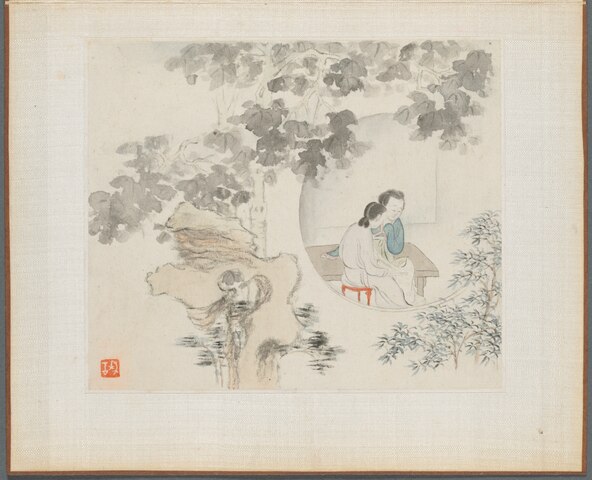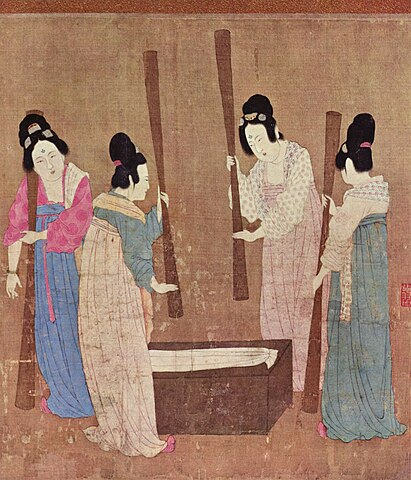
Through the generosity of the late Professor Benedict Anderson and Ajarn Charnvit Kasetsiri, the Thammasat University Library has newly acquired some important books of interest for students of Association of Southeast Asian Nations (ASEAN) studies, political science, literature, and related fields.
They are part of a special bequest of over 2800 books from the personal scholarly library of Professor Benedict Anderson at Cornell University, in addition to the previous donation of books from the library of Professor Anderson at his home in Bangkok. These newly available items will be on the TU Library shelves for the benefit of our students and ajarns. They are shelved in the Charnvit Kasetsiri Room of the Pridi Banomyong Library, Tha Prachan campus.
Among them is a newly acquired book that should be useful to TU students who are interested in literature, Chinese language, translation studies, linguistics, Asian history, and related subjects.
Chinese Poems was translated by Arthur Waley, an English orientalist and sinologist who achieved popular and scholarly acclaim for his translations of Chinese and Japanese poetry.
Waley avoided academic posts and most often wrote for a general audience. He chose not to be a specialist but to translate a wide and personal range of classical literature.
Waley taught himself to read Classical Chinese and Classical Japanese, but never learned to speak either modern Mandarin Chinese or Japanese and never visited either China or Japan.
His books included A Hundred and Seventy Chinese Poems (1918); Japanese Poetry: The Uta (1919); and The Tale of Genji (1925–26).
Waley also presented and translated Chinese philosophy.
The TU Library collection includes several books by Waley.
Professor Jonathan Spence of Yale University wrote about Waley’s translations:
[He] selected the jewels of Chinese and Japanese literature and pinned them quietly to his chest. No one ever did anything like it before, and no one will ever do it again. There are many westerners whose knowledge of Chinese or Japanese is greater than his, and there are perhaps a few who can handle both languages as well. But they are not poets, and those who are better poets than Waley do not know Chinese or Japanese. Also the shock will never be repeated, for most of the works that Waley chose to translate were largely unknown in the West, and their impact was thus all the more extraordinary.

In an introduction, Waley stated:
Those who wish to assure themselves that they will lose nothing by ignoring Chinese literature, often ask the question: “Have the Chinese a Homer, an Aeschylus, a Shakespeare or Tolstoy?” The answer must be that China has no epic and no dramatic literature of importance. The novel exists and has merits, but seldom became the instrument of great writers. Her philosophic literature knows no mean between the traditionalism of Confucius and the nihilism of Chuang-tzu. In mind, as in body, the Chinese were for the most part torpid mainlanders. Their thoughts set out on no strange quests and adventures, just as their ships discovered no new continents. To most Europeans the momentary flash of Athenian questioning will seem worth more than all the centuries of Chinese assent. Yet we must recognize that for thousands of years the Chinese maintained a level of rationality and tolerance that the West might well envy. They had no Index, no Inquisition, no Holy Wars. Superstition has indeed played its part among them; but it has never, as in Europe, been perpetually dominant. It follows from the limitations of Chinese thought that the literature of the country should excel in reflection rather than in speculation. That this is particularly true of its poetry will be gauged from the present volume. In the poems of Po Chu-I, no close reasoning or philosophic subtlety will be discovered; but a power of candid reflection and self-analysis which has not been rivalled in the West.
Turning from thought to emotion, the most conspicuous feature of European poetry is its pre-occupation with love. This is apparent not only in actual “love-poems,” but in all poetry where the personality of the writer is in any way obtruded. The poet tends to exhibit himself in a romantic light; in fact, to recommend himself as a lover. The Chinese poet has a tendency different but analogous. He recommends himself not as a lover, but as a friend. He poses as a person of infinite leisure (which is what we should most like our friends to possess) and free from worldly ambitions (which constitute the greatest bars to friendship). He would have us think of him as a boon companion, a great drinker of wine, who will not disgrace a social gathering by quitting it sober.

Here are some sample translations of Chinese poetry by Arthur Waley:
The Lychee-Tree
by Wang I [c. A.D. 120]
Sombre as the heavens when morning clouds arise,
Bushy as a great broom held across the sky,
Vast as the spaces of a lofty house,
Deep fretted as a line of stony hills.
Long branches twining.
Green leaves clustering.
And all a-glimmer like a mist that lightly lies
Across the morning sun;
All spangled, darted with fire like a sky
Of populous stars.
Shell like a fisherman’s red net;
Fruit white and lustrous as a pearl, . . .
Lambent as the jewel of Ho, more strange
Than the saffron-stone of Wu.
Now sigh we at the beauty of its show.
Now triumph in its taste.
Sweet juices lie in the mouth;
Soft scents invade the rind.
All flavours here are joined, yet none is master;
A hundred diverse tastes
Blend in such harmony no man can say
That one outstrips the rest. Sovereign of sweets.
Peerless, pre-eminent fruit, who dwellest apart
In noble solitude!
*
Hot Cake
by Shu Hsi [c. A.D. 281]
Winter has come; fierce is the cold;
In the sharp morning air new-risen wc meet.
Rheum freezes in the nose;
Frost hangs about the chin.
For hollow bellies, for chattering teeth and shivering knees
What better than hot cake.”
Soft as the down of spring,
Whiter than autumn wool!
Dense and swift the steam
Rises, swells and spreads.
Fragrance flies through the air.
Is scattered far and wide.
Steals down along the wind and wets
The covetous mouth of passer-by.
Servants and grooms
Throw sidelong glances, munch the empty air.
They lick their lips who serve;
While lines of envious lackeys by the wall
Stand dryly swallowing.
*
New Corn
by T’ao Ch’ien (A.D. 365-427)
Swiftly the years, beyond recall.
Solemn the stillness of this fair morning.
I will clothe myself in spring-clothing
And visit the slopes of the Eastern Hill.
By the mountain-stream a mist hovers,
Hovers a moment, then scatters.
There comes a wind blowing from the south
That brushes the fields of new corn.
*
Dreaming that I went with Lii and Yil to visit Yuan Chen
by Po Chu-i
Written in Exile
At night I dreamt I was back in Ch’ang-an;
I saw again the faces of old friends.
And in my dreams, under an April sky,
They led me by the hand to wander in the spring winds.
Together we came to the village of Peace and Quiet;
We stopped our horses at the gate of Yuan Chen.
Yuan Chen was sitting all alone;
hen he saw me coming, a smile came to his face.
He pointed back at the flowers in the western court;
Then opened wine in the northern summer-house.
He seemed to be saying that neither of us had changed;
He seemed to be regretting that joy will not stay;
That our souls had met only for a little while,
To part again with hardly time for greeting.
I woke up and thought him still at my side;
I put out my hand; there was nothing there at all.

(All images courtesy of Wikimedia Commons)
